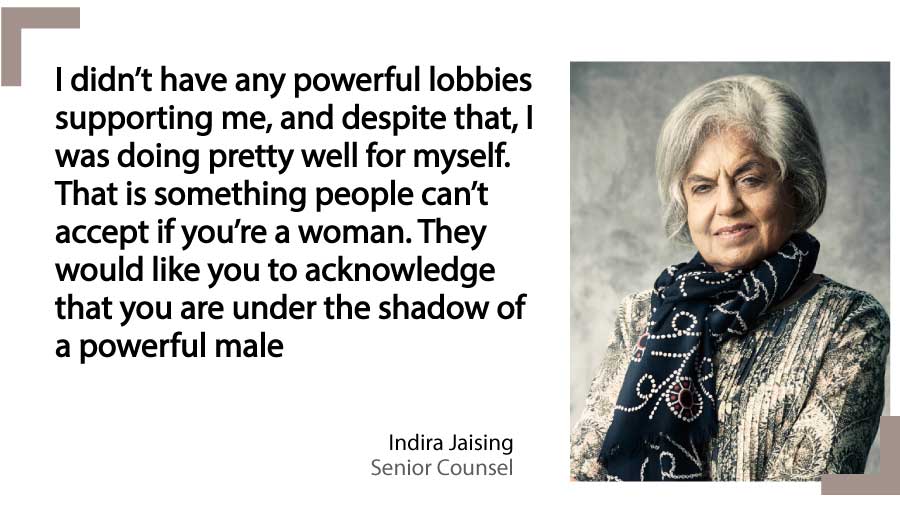Candid conversations with some of India’s fiercest women litigators show that thriving at the bar requires tenacity, toughness and the courage to take down patriarchy. Vandana Chatlani reports
Ligating in India’s courtrooms is not for the fainthearted. It demands drive, passion, determination, persistence, energy and mental stamina. While those in the field speak of the excitement and adrenaline associated with trials, they also admit that such work is financially less rewarding than other avenues of the legal profession. Only those with fire in their bellies survive.
For decades, women have fought for their place in the courts, working harder than their male counterparts to prove their worth. After all, women at the bar face challenges far beyond the arduous hours of preparation and mastering of legal briefs. Talk to women in the field and they will tell you that success in court requires thick skin and self-belief as strong as a coat of armour. For years, women were told they didn’t belong, and that they lacked the knowledge and commitment necessary to stay in the game. When they did succeed, they attracted comments that in Indira Jaising’s words, were part of a “patronizing paradigm”.
Jaising, the first woman to become a senior counsel in India and the country’s first female additional solicitor general, is synonymous with excellence in legal circles. That someone of her calibre – and indeed any woman lawyer, junior or senior – still experiences a lack of respect in the profession on gender grounds is an ugly truth that the legal community must acknowledge.
“Gender is more relevant to others than your performance,” says Jaising. “It’s almost as though because you’re a woman, they don’t expect you to succeed. Of course it bothers me. It bothers me very much, and I’m not sure that I’ve succeeded in dealing with it as yet. It can still sometimes throw me off balance. But the most important thing is I will not succumb to being patronized.”
Jaising honed her skills in Bombay High Court, a forum where she found “a certain openness and a more democratic approach”, which she says gave her the freedom to practise her own way, representing those desperate for justice, such as the victims of the Bhopal Gas Tragedy. She and her husband, Anand Grover, also set up the Lawyers Collective, a non-governmental organization committed to feminist and left-wing causes. Interestingly, Jaising experienced a sense of ostracism much later in her career, partly because of her gender and partly because she rejected the status quo.
“I didn’t have any powerful lobbies supporting me, and despite that, I was doing pretty well for myself,” she says. “That is something people can’t accept if you’re a woman. They would like you to acknowledge that you are under the shadow of a powerful male. If you’re unwilling to do that, and you don’t need to do that, then you will hit some kind of ceiling. That’s been my experience. I have never encountered any problems with the people I represent, which is evidence of the fact that the problem lies elsewhere.”
For Jaising, inequality, nepotism and discrimination are not topics to discuss for the sake of intellectual debate and political correctness. Never afraid of ruffling feathers, she gave up her senior counsel gown in August 2017 in a symbolic protest against discrimination, as she called for a transparent, formulaic and meritocratic appointment of senior counsel, and an end to the different gowns worn by junior and senior counsel.
You must be a
subscribersubscribersubscribersubscriber
to read this content, please
subscribesubscribesubscribesubscribe
today.
For group subscribers, please click here to access.
Interested in group subscription? Please contact us.



























